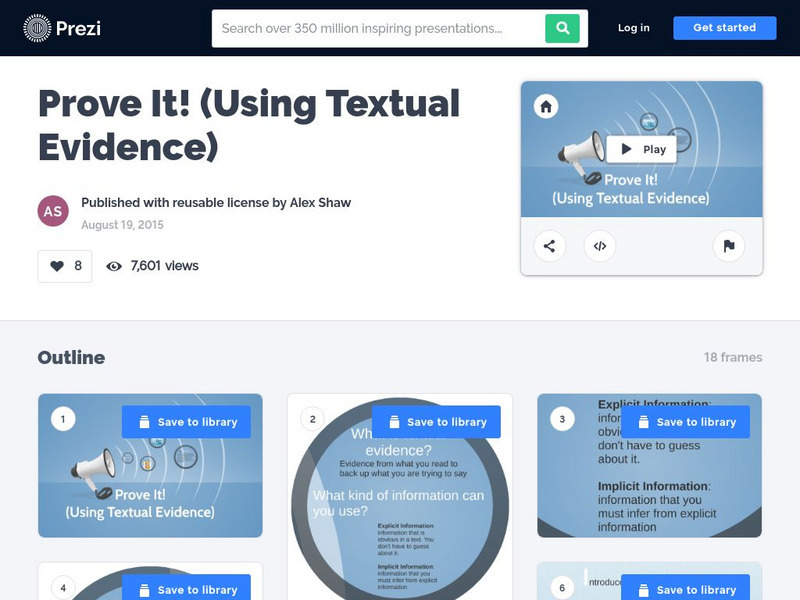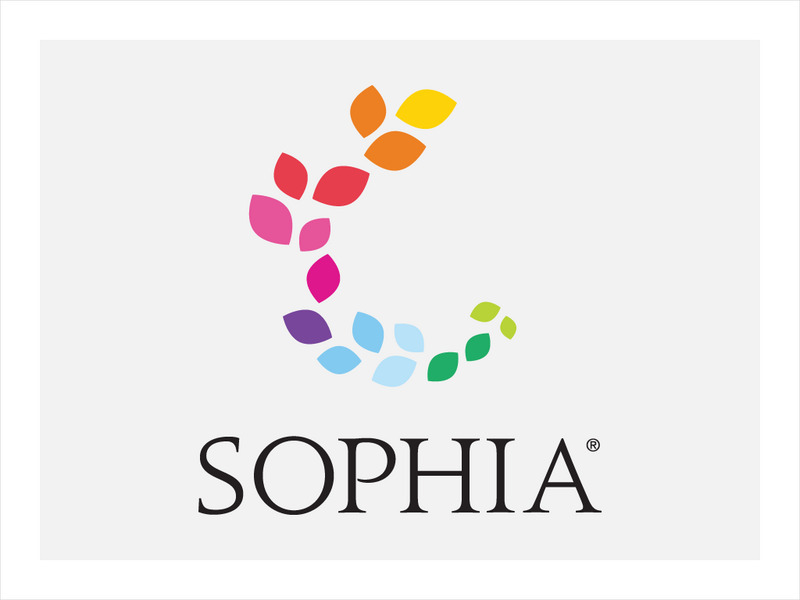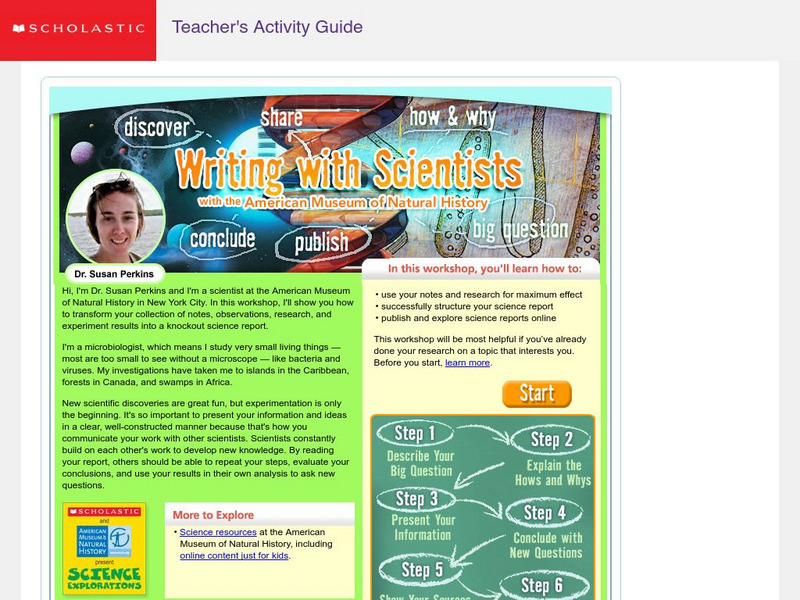Curated OER
Analyzing Free and Fair Elections
Young scholars brainstorm the qualities of a "free and fair" elections. They read background information pertaining to the upcoming 2007 presidential elections. Pupils compare the "free and fair" elections list composed by students to...
Curated OER
Exercise for Writing a Summary Paragraph
High schoolers examine how to write article summaries of abstracts. In this writing skills lesson, students edit the noted sections of an abstract that is already written on the Old Testament Abstracts.
Thinkport Education
Thinkport: Citing Textual Evidence: Changing Oceans
Learn how to cite evidence to support ideas presented in a science article about oceans.
University of North Carolina
University of North Carolina: Writing Center: Handouts: Evidence
What kinds of evidence best support the points you make in a paper? Where can you find the evidence you need? This handout answers all these questions and more, including the difference between primary and secondary sources. You'll also...
Other
Warren County Schools: Citing Textual Evidence
Well-organized and in-depth lesson on citing textual evidence and understanding inferences. Many examples are included, as well as exercises for the students to practice what they have learned. [PDF]
Other
Prezi: Prove It! (Using Textual Evidence)
Slideshow explains textual evidence and how to use the I.C.E. method when citing it.
Better Lesson
Better Lesson: Avoiding Plagiarism and Citing Sources
In this scaffolded lesson, students engage in practice with determining whether or not research has been plagiarized. A short video demonstration is included. [03:44] This lesson addresses all three College and Career Readiness Standards...
Better Lesson
Better Lesson: Writing an Opinion Based on Facts From a Text
Students will plan a paragraph that states their opinion and cites evidence to justify their opinion about an informational text. This activity uses biographies since students can easily be able to write down factual information from the...
Thinkport Education
Thinkport: One Person Can Change the World
In this module, students will read primary and secondary sources about events from the Reformation movement. They will identify the central ideas of the texts, and cite evidence from the text that supports the central idea.
Sophia Learning
Sophia: Critical Reading as a Learning Strategy
This tutorial focuses on critical reading using a downloadable PowerPoint presentation, "Critical Reading 101," which includes separating fact from opinion, 6 propaganda techniques, and 6 common fallacies in reasoning. Also provided is...
Lumen Learning
Lumen: Building Credibility Through Source Integration
Well-integrated sources build credibility in several ways: Source material adds evidence and support to your argument, the signal phrase highlights the reputation and qualifications of the source, and effective citation makes it easy for...
Ohio Test Prep
Ohio Test Prep: Bill of Rights
Ohio test preparation material on the Bill of Rights provides three video tutorials that hit specifically learning target 9 which is to cite evidence for historical precedents to the rights incorporated in the Bill of Rights.
Other
Simply Psychology: Visual Perception Theories
Bottom-Up Processing and Top-Down Processing are two schools of thought when scientists discuss how humans perceive the senses which they experience. This article explores the two theories of visual perception and cites evidence and...
Scholastic
Scholastic: Informational Text: Reading Response: Claim Evldence Reasoning [Pdf]
This graphic organizer can be used with students when they read informational text. Students will identify a claim, list text evidence that supports the claim, and explain how the information can be used for their future understanding of...
AdLit
Ad lit.org: Classroom Strategies: Inferential Reading
Teaching students to "read influentially" helps them learn how to read more strategically. This technique is derived from the teaching model that learners develop knowledge via the process of interpreting new information in light of past...
Polk Brothers Foundation Center for Urban Education at DePaul University
De Paul University: Center for Urban Education: Identify/infer Character Traits [Pdf]
This page contains links for three graphic organizers. Students will use graphic organizers to identify character traits, infer character traits, and support inferences with text evidence.
Sophia Learning
Sophia: Supporting Details Explained
This slideshow focuses on supporting details; it discusses their purpose, the audience, and the point to be made. It lists the five most common types of supporting details: facts, statistics, opinions, examples, and personal observations...
E Reading Worksheets
E Reading Worksheets: Setting Worksheets
In this learning module, students will study the concept of setting in literary text. Worksheets and PowerPoint lessons are provided to help students practice with finding "settings" and then citing reasons that support their answers.
CommonLit
Common Lit: Units: 8th Grade Argumentative Writing Unit: Improving Society
Complete teaching unit for 8th Grade Argumentative Writing Unit: "Improving Society." Students will read six texts about problems in society. Throughout the unit, 8th graders will gather information from their readings in a graphic...
CommonLit
Common Lit: Units: 12th Grade: Thematic Unit: Morality
This is a complete teaching unit for 12th Grade Thematic Unit: "Morality." In this unit, 12th graders will read eight texts that speak to the theme of morality. Students will revisit the essential question "How do we evaluate what's...
CommonLit
Common Lit: Units: 11th Grade: Thematic Unit: Values and Beliefs
Complete teaching unit for 11th Grade Thematic Unit: "Values and Beliefs." Students will read 8 short stories that examine how values and beliefs are shaped. They will analyze these stories, and the short story form, while considering...
CommonLit
Common Lit: Units: 9th Grade Thematic Unit: Love
Complete teaching unit for 9th Grade Thematic Unit: "Love." In this unit, 9th graders will read six texts that speak to the theme of love. They will revisit the essential question "What is love, and how does it change us?" throughout the...
University of Virginia
University of Virginia: A View of the Rights of British America
Before writing the Declaration of Independence, Thomas Jefferson made his views known through "A Summary View of the Rights of British America" and other essays. This essay discusses the historical roots of independence and inalienable...
Scholastic
Scholastic: Writing With Scientists With the American Museum of Natural History
Follow this six-step method and you'll have a good understanding of what a good scientific research paper involves and how it is organized. There are plenty of samples for you to look at. This explanation is also very helpful for...













![Scholastic: Informational Text: Reading Response: Claim Evldence Reasoning [Pdf] Graphic Scholastic: Informational Text: Reading Response: Claim Evldence Reasoning [Pdf] Graphic](https://content.lessonplanet.com/knovation/original/244734-74184753ee53d6872b10ba36f1639585.jpg?1661510818)

![De Paul University: Center for Urban Education: Identify/infer Character Traits [Pdf] Graphic De Paul University: Center for Urban Education: Identify/infer Character Traits [Pdf] Graphic](https://content.lessonplanet.com/knovation/original/119983-62ee3880b7ac71dbc7bc636a19f336da.jpg?1661787060)

